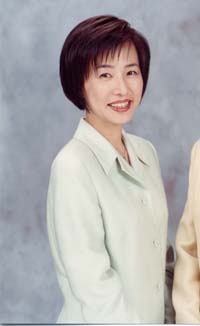Bringing Women Together
Back to Contents of Issue: October 2002
|
|
|
|
by Takehiko Kambayashi |
|
 KAORI SASAKI DOESN'T LOOK back. She builds something and moves on, seemingly forever going forward. When she decided to hold a large-scale conference for working women about seven years ago, she recalls how one business leader scoffed at her idea, telling her she would only attract the "dropouts of the Japanese economy." She brushed off the remark and built her conference anyway. KAORI SASAKI DOESN'T LOOK back. She builds something and moves on, seemingly forever going forward. When she decided to hold a large-scale conference for working women about seven years ago, she recalls how one business leader scoffed at her idea, telling her she would only attract the "dropouts of the Japanese economy." She brushed off the remark and built her conference anyway. The 7th annual International Conference for Women in Business was held late this July. The event attracted more than 730 participants -- mostly women from across Japan and some from overseas. This year's theme was "Accepting the Challenge to Change," and Carlos Ghosn, president and CEO of Nissan, was the keynote speaker. According to an organizer of the event, the $120 tickets were snapped up in a couple of weeks; more than 70 percent of the participants paid their own way. The conference reflects the rising influence of women in business in Japan. Sasaki, a good example of that influence, is one of Japan's most visible female entrepreneurs. She runs Unicul International, a communication consulting firm, and eWoman, another consulting company operating a major Web site for women. Sasaki, a thin, self-possessed woman, was a journalist for TV Asahi. On one assignment in South Africa, where she was covering a demonstration of the Inkatha Freedom Party, she was shot in the leg. After being hospitalized and treated, she crawled out of bed and hopped on her good leg to interview Nelson Mandela. Such tenaciousness seems to have been built up at an early age. At the age of 15, Sasaki began earning \1,500 a day by distributing concert fliers. She didn't like receiving money from her parents because they didn't have enough, she says. "I thought I would be very sorry if I got any money from them, so I was thinking about ways not to do so," she recalls. After entering Sophia University, she worked much harder. While going to the university and an English language school, she squeezed her part-time work into her busy schedules, sleeping for only a couple of hours a night. She also paid her own tuition for the language school and Sophia. Sounds tough, but Sasaki says she never considered that period a struggle. "That was when I started out on my own, not doing something my parents asked for," she responds coolly, adding that she never felt poor, sad or lonely, nor did she envy her spoiled schoolmates at Sophia. "I never compared myself with others." Sasaki began her career as a freelance interpreter and established Unicul International in 1987. "Until I was 25 or 26 years of age, I had never imagined I would establish a company," she says. She says she pictured herself after marriage as an obedient housewife clad in kimono serving her husband at home. But Sasaki continued expanding her networks. In her late 20s, she decided she wanted to meet other working women her age who had similar enthusiasm and energy, so she founded the Network for Aspiring Professional Women (NAPW) in 1989. She is currently the chair. NAPW members include doctors, lawyers, business owners and saleswomen. Its regular conferences have grown into the International Conference for Women in Business. Although she does not make money from her NAPW activities, forming the group helped Sasaki "make my way of life clear," she says. Sasaki has never accepted the role of women in business as being secondary to men. That's partly why she founded eWoman in 2000 and became president and CEO of the company. She sees the move as a "big challenge." She argues that most influential consumers are working women and working mothers -- what eWoman calls "Smart Consumers." The company can provide corporations with a link to these consumers and help them create marketing plans and develop new goods and services. Sasaki, married and a mother of two, believes that an increasing number of female entrepreneurs have had a strong impact on Japan's economy, but unlike the US, Japan has no data to substantiate her claim. Sasaki says eWoman is considering creating a database of female entrepreneurs. @ |
|
Note: The function "email this page" is currently not supported for this page.





